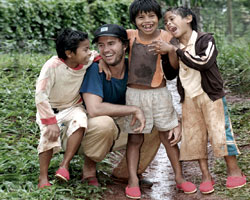A One-for-One Revolution
 In an economy once focused solely on turning a profit, more and more companies are looking for ways to improve the quality of life for others. These forward-thinking companies have adopted a system known as “one for one,” in which, for every unit of a product sold, the company donates one similar or related item to people in need. Already, the one-for-one strategy has enabled companies to provide aid around the world. And the companies funding these humanitarian and environmental efforts are also selling eco-friendly products.
In an economy once focused solely on turning a profit, more and more companies are looking for ways to improve the quality of life for others. These forward-thinking companies have adopted a system known as “one for one,” in which, for every unit of a product sold, the company donates one similar or related item to people in need. Already, the one-for-one strategy has enabled companies to provide aid around the world. And the companies funding these humanitarian and environmental efforts are also selling eco-friendly products.
Freewaters makes flip-flops from recycled and PVC-free rubber, as well as a new line of comfy-for-winter house shoes. With each purchase the company provides clean drinking water for one person in Kenya for a year. To support the effort, they launched a nonprofit—projectfreewaters.org—where people can follow the organization’s well-digging efforts and see the good their purchases have brought.
The TOMS Way
The founders of Freewaters, which began retailing in spring 2011, were inspired by shoe company TOMS, widely considered the pioneer of “one for one.” During his travels to South America, TOMS founder Blake Mycoskie discovered that children too poor to afford shoes face a constant risk of injury, infection and transmission of soil- and water-borne diseases and parasites. And children who cannot afford shoes are often turned away from schools where shoes are a dress code requirement. So Mycoskie founded TOMS in 2006 with a mission to make attractive, responsibly constructed shoes for customers and, for every pair sold, provide a pair of shoes to an impoverished child. This would help reduce the health risks and educational limitations faced by so many children worldwide. The idea was simple and surprisingly effective. And TOMS uses canvas made from a blend of organic canvas and post-consumer recycled plastics. “It makes for a really strong canvas, which is great because it lasts long, and it’s also much more environmentally friendly,” Mycoskie told TreeHugger Radio. TOMS also offers a line of vegan shoes made without leather or other animal-based materials. As evidenced by the enormous popularity of the casual, comfortable shoes, both the message and the look have really resonated.

In fact, the shoes have been so successful that TOMS recently launched an eyewear line. Instead of giving out a pair of eyeglasses to those in need with each pair purchased, the company goes one step further: providing medical treatment, prescription glasses or sight-saving surgery for one person in the developing world without access, beginning with Nepal, Cambodia and Tibet. Now TOMS is no longer just a shoe brand—but a one-for-one company with endless possibilities for expansion.
Providing Sustenance
Two Degrees, another one-for-one company, began in January 2011. Within six months, the company was selling its vegan, gluten-free nutrition bars in Whole Foods Markets nationwide. Co-founders Will Hauser and Lauren Walters say they, too, were inspired by the success of TOMS to fight for a cause of their own—helping the 200 million malnourished children around the world. They teamed up with Valid Nutrition and Partners in Health to produce and distribute highly beneficial nutrition packs that are, as Hauser explains, “extremely successful but undersupplied.” Unlike shots that have traditionally been used to fight malnutrition (with only a 25%-40% recovery rate), nutrition packs feature a nutrient-rich paste that requires no preparation or medical supervision—hence the name: Ready-to-Use Food. The packs offer up to a 95% success rate for recovery from even severe cases of malnutrition, but currently reach only 3% of the children who need them.
Like other one-for-one companies, Two Degrees’ plan is simple: For every nutrition bar you buy, Two Degrees donates one nutrition pack to a malnourished child. The one-for-one model offers a unique opportunity for consumers to buy healthy, environmentally responsible and ethical products, while also donating to worthy causes. It’s a win-win. “What’s so compelling about the model is how simple and tangible it is,” Hauser says. “Consumers know and understand the impact they’re making.”

